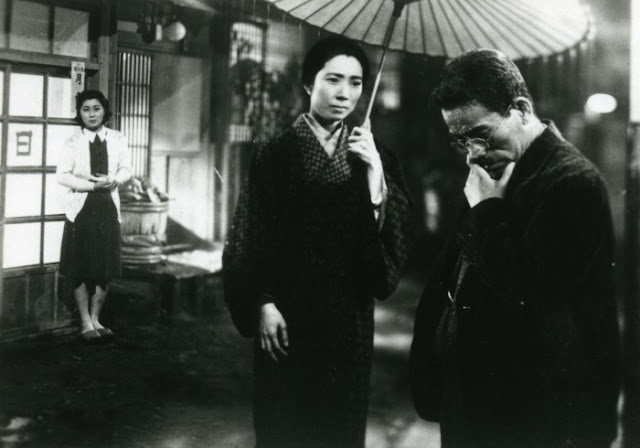 |
| Mitsuko Mito, Chiyo Nobu, and Eijiro Tono in Jubilation Street |
Takako: Mitsuko Mito
Kiyo Furukawa: Chiyo Nobu
Shingo's Father: Eijiro Tono
Bathhouse Owner: Makoto Kobori
Bathhouse Owner's Wife: Choko Iida
Director: Keisuke Kinoshita
Screenplay: Kaoru Morimoto
Cinematography: Hiroshi Kusuda
There's a kind of quiet desperation in the patriotism on display in Keisuke Kinoshita's Jubilation Street. Kinoshita could not have ignored the censors' demands for the flag-waving ending and the vows to revenge the death of one of the central characters, but maybe it's only postwar hindsight that makes me feel that his heart wasn't in it. Or maybe he was more interested in his characters than in manipulating them to serve the war effort. The titular street is condemned to be torn up by the military for unspecified wartime purposes, but the longtime residents are at first not thrilled by being dislocated to serve their country. The film depicts their struggle to hold on as long as they can, some out of stubbornness, like the bathhouse owner who doesn't want to leave a place where he has run his business for so long -- though he has to admit, when someone reminds him, that he won't have any customers after all the other neighbors leave. And some, like Kiyo Furukawa, want to remain for more deeply personal reasons: She's afraid that if the husband who left her and their son, Shingo, so many years ago suddenly decides to return he won't be able to find them. Shingo is already doing his part in the war as a test pilot, but he has also fallen in love with the pretty Takako, whose family wants her to enter into an arranged marriage. They are afraid that separation will prove fatal to their love. The plot then takes a predictable turn: Shingo's father returns, though Kiyo has misgivings about resuming their marriage when she learns how many varied jobs he has held over the years, an indicator that the instability that caused him to leave is still a problem. But then an event -- one that most filmgoers will have predicted on their own -- alters everything. Good performances aren't enough to lift this early Kinoshita film above routine, but the director's characteristic humanity (and equally characteristic sentimentality) gives it a warmth that even the ham-fisted propaganda can't quite obliterate.